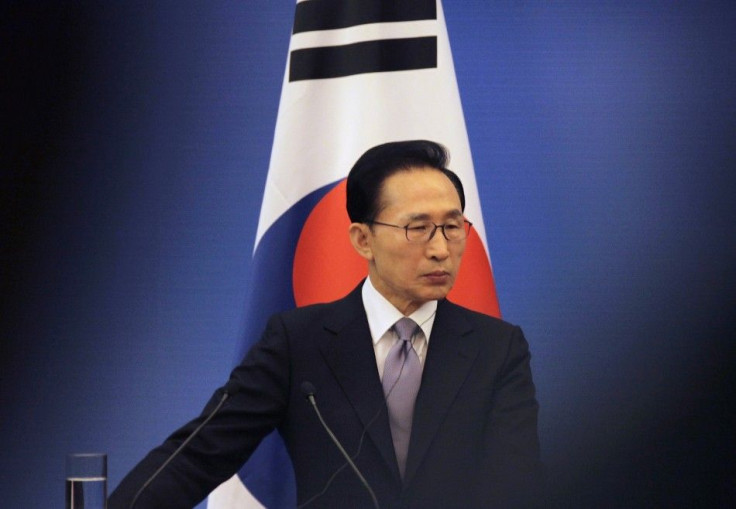South Korean President Lee Myung-Bak Makes Historic Visit To Myanmar

On Monday, South Korean President Lee Myung-bak visited Myanmar to meet with top officials there.
This is the first time a South Korean leader has set foot in Myanmar in almost 30 years, and security in the capital city of Naypyidaw will be tight throughout the two-day stop-over. The last time a South Korean president visited Myanmar was in 1983, when officials were violently attacked by North Korean forces.
Lee's unannounced visit to Myanmar signifies a growing trade relationship and sends a diplomatic message of unity between the two countries. He will meet with Myanmar President Thein Sein and attend a banquet on Monday. On Tuesday, he is scheduled to host a business luncheon. BBC reports that he may also stop in Rangoon, where he may visit the Martyrs' Mausoleum.
That mausoleum was the site of a 1983 attack, orchestrated by North Korea, that claimed the lives of 17 South Korean officials and four residents of Myanmar, which was then called Burma. Then-South Korean President Chun Doo-hwan escaped death because he was late for a scheduled ceremony, having been held up in traffic. The ceremony would have honored the late General Aung San, a hero of Burma's independence from Britain in 1947.
Lee's arrival on Monday defies fears of a reprisal of North Korea's brutal 1983 attack. It is especially bold considering that North Korea's relationship with its southern neighbor is as tense as ever.
Myanmar, on the other hand, has changed since 1983 -- especially in recent months. Today General Aung San's daughter, politician and civil activist Aung San Suu Kyi, has become a popular figure and a symbol of progress within the country. Her opposition party, the National League for Democracy, recently swept parliamentary elections. The formerly authoritarian country is slowly liberalizing under President Thein Sein, while Suu Kyi's clear victory marked a milestone in Myanmar's ongoing democratization.
Though a military junta still holds significant power over Myanmar's government, Suu Kyi and her many supporters are fighting for greater political transparency and market openness. This potential for change has garnered an influx of international attention and praise in recent months -- Lee is the most recent in a long line of visiting dignitaries.
Economically, both South Korea and Myanmar have much to gain from a stronger partnership.
Korea corporate interest in Myanmar has grown since last year on optimism the U.S.-led sanctions would be eased, said Kim Jong Sang, a researcher at the Korea Trade-Investment Promotion Agency in Seoul, to Bloomberg News. Cheap wages, which are a third of that in China, is one appealing factor.
South Korean Foreign Trade Minister Kim Sung-hwan visited Myanmar earlier this month to discuss more economic cooperation in advanced sectors including engineering and technology, reports Chinese news agency Xinhua. This is on top of existing arrangements; South Korea has already invested about $2.9 billion into Myanmar since 1988, and bilateral trade reached about $970 million in 2011. Now, the economic relationship between the two countries may grow even stronger.
But Lee's visit also has diplomatic implications -- particularly with respect to North Korea.
Lee's stealthy flight to Myanmar followed a Sunday meeting in Beijing with Chinese Premier Wen Jiabao and Japanese Prime Minister Yoshihiko Noda. The leaders of East Asia's three largest economies discussed regional diplomacy and agreed that they would not tolerate further affronts from North Korea, which is suspected of planning nuclear tests in violation of international non-proliferation agreements.
The threat is especially worrisome after North's Korea's failed launch of a long-range rocket in April, as Supreme Leader Kim Jong Un may now be looking for ways to strengthen his military reputation.
Like the North Korean regime, the formerly authoritarian Myanmar government was accused of human rights violations and heavily sanctioned. This engendered a circumstantial alliance between the two nations. Diplomatic relations had been closed after the 1983 attack, but they reopened in 2007. At that point, Naypyidaw established a close economic relationship with Pyongyang, and the two governments were suspected of cooperation on nuclear weapons technology.
Now that Myanmar is showing signs of political openness and a liberalized economy, international leaders are opening up the lines of dialogue in hopes of discouraging an alliance with North Korea.
U.S. Secretary of State Hillary Clinton, whose visit to Naypyidaw last year was the first in 50 years for someone of her rank, said that Myanmar should sever illicit ties to North Korea. Other recent visitors, including British Prime Minster David Cameron and UN Secretary General Ban Ki-moon, have also sought to align Myanmar's development with Western interests.
© Copyright IBTimes 2024. All rights reserved.





















